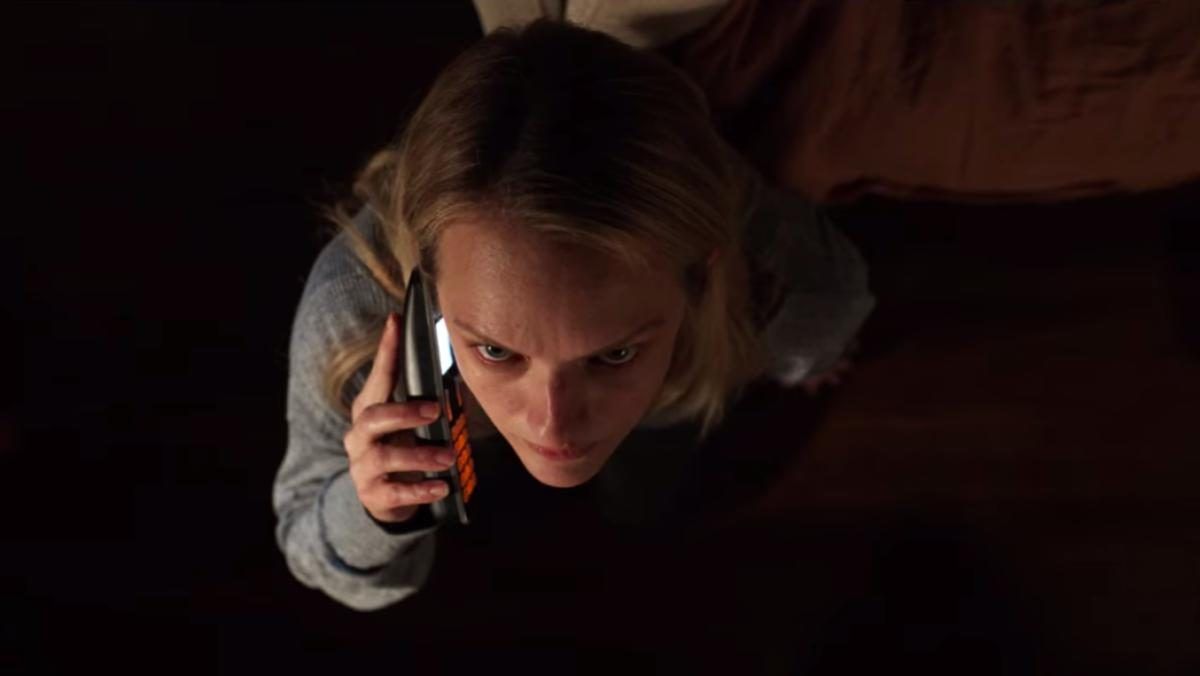Emotional abuse is almost impossible to “prove,” if that’s even a useful way to discuss something that is fundamentally subjective and unquantifiable. The scars are invisible, and besides, the abuser is usually just about the most charming person everyone has ever met – to everyone other than his/her victim, that is. In Leigh Whannell’s update of The Invisible Man, the abuser himself is also invisible, leaving only his tormented victim to try to convince everyone else she’s not crazy, and that she’s not responsible for doing the things he’s made it look like she’s done. If there’s a better metaphor for our modern times, in which we are only just starting to create a culture where the victim isn’t the first person blamed, I don’t know what it might be.
Any number of treatments of this material have considered the notion that a person who can make themselves invisible might just be a creep. Whether they designed the invisibility tech because they’re a creep, or whether having designed the tech turned them into a creep, is the big chicken-or-the-egg question. Paul Verhoeven’s Hollow Man came down clearly on the second side, as Kevin Bacon’s character descends almost instantly from a nice guy to a sociopath once he becomes invisible – not nearly that film’s only problem.
Whannell’s invisible man is clearly the former. Adrian Griffin (Oliver Jackson-Cohen) is a very rich man and a leading innovator in optical sciences, but the more pertinent characterisation is that he’s a massive creep. He keeps his girlfriend Cecilia (Elisabeth Moss) effectively imprisoned in his seaside mansion with its security systems upon security systems, and has told her more than once that there’s nothing she can do to escape him.
Cecilia doesn’t believe that – or rather, she might believe he’s capable of it, but she has to try anyway. So one night she drugs him into sleeping more deeply than he usually does, and enacts a long-premeditated sequence of security disarmings that will allow her a chance at her much-cherished freedom. Even once she’s gotten free, though, she senses that Adrian is still near her – maybe even in the same room. He didn’t tell anyone he figured out a way to make himself invisible, but if anyone could do it, it would be Adrian.
Whannell avoids these pitfalls by basically not showing the invisible man at all – at least for the first half of the film. In The Invisible Man, the Melbourne-born writer-director demonstrates a previously under-utilised aptitude for establishing a mood of dread, all through the way he sets up and moves his camera. Less is definitely more in the opening few acts of this film, as the camera will travel to a place in the room where nothing is apparently happening. Even after it gets there, nothing still happens. Except you know, just because you do, that there is a man there, watching the other people in the room.
It’s enough to give a person chills, even in print. And unfortunately, it’s unsustainable as a primary mode for the film. The stakes must necessarily escalate from that discomfiting but vague feeling that someone is watching you, which creates a lot of tension for the first half of the film, to the unambiguous proof that there is a malevolent presence specifically messing with you.
Fortunately, there’s delicious fun to be had in this section of the film as well. Once Moss’ Cecilia knows for certain that someone is there, and that she has few strategies even to verify his presence at any given time, she shifts to desperate ploys to combat the uncombattable and prove she’s not guilty of the crimes for which he’s framing her. There are also some good shock surprises. Even in this section, Whannell is smartly able to keep us guessing, as it’s always possible we’re dealing with an unreliable narrator here. After all, the anti-psychotic drug Diazepam, for which Cecilia has a prescription, factors into the action.
This role is right in Moss’ wheelhouse as an actor. In the past ten years she has gravitated toward roles in which her sanity was in question, particularly her collaborations with writer-director Alex Ross Perry, Queen of Earth and Her Smell. She loves exploring the frayed edges of a character and then tearing those edges wide open. She’s got a facial tic for every subtle shift in the stakes of a situation, but don’t let the use of the word “tic” make it sound like a backhanded compliment. This is a performer who can delve deep into reserves of frightening anguish, who seems like she herself must have been tormented in order to play a tormented person this convincingly. Fortunately for her, Moss is just really good at what she does, and does not seem to have had a traumatic personal history.
Moss’ performance is key in terms of what this film is trying to do, politically. Whannell is conscious of his responsibilities as a filmmaker in the #MeToo era, and this film is a pretty potent metaphor for the way people, specifically women, feel when they are under the thumb of an abuser. It feels like there’s no escape and that the abuser is hovering, looming, even when he is not. Adrian’s motivations as a character are sometimes difficult to understand, which at first might seem like poor writing. But perhaps there’s a point to that. In 2020, it’s not really our collective role to get inside the mind of an abuser and what makes him tick. That person’s subjectivity has been explored too much already. Why someone is abusive is, ultimately, as meaningless as a character without motivation. It’s the non-negotiable fact of his toxic behaviour that we must grapple with, not its origins.
In the final analysis, you still need a movie that feels internally consistent in order for it to fulfil its potential, and as it moves closer to its climax, The Invisible Man is not that. It has too many genre contrivances, feats of impossible speed and agility, moments that remind you of Jason in the Friday the 13th movies, where the villain was everywhere, even places there was no possible way he could be. There are many nits to pick here. But there are many more things it does well, making The Invisible Man worthy of the additional visibility it’s getting.



